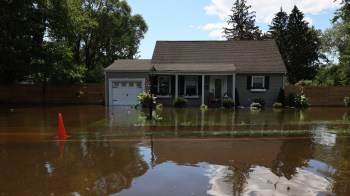Wall Street commuters struggle after hurricane
Jeremy Hobson: Let’s get to the aftermath of Hurricane Irene — for the East coast, and for the financial system.
Our regular Monday guest Julia Coronado is actually trapped in Cleveland because of the storm, so we’re joined instead by our New York bureau chief Heidi Moore, who is with us live. Good morning.
Heidi Moore: Hi Jeremy.
Hobson: Well first of all, you’re not trapped in Cleveland or anywhere else — you’re in the office. What are things like in New York this morning when it comes to the commute?
Moore: It’s almost completely deserted outside. A lot of Wall Street firms just told people to stay home. I talked to one of our building people and I said, “Well, maybe people didn’t hear that the subways were running again.” And he said, “No, they heard — they pretended they didn’t.” And I think that’s kind of an accurate reading of what went on today. It’s a Monday in August, it’s really slow, and we’re not seeing a really crowded street out there. So people have just taken a chance to stay easy or to clean up if they need to clean up.
Hobson: And when people stay home, is there any effect on the financial markets?
Moore: Surprisingly, not so much. As you know, a lot of stuff is automated, and it just doesn’t require everyone to be at their desks every single day. So, if you’re a non-essential employee at the New York Stock Exchange, for instance — you can stay home. If you work on the trading floor, then you were probably put up in a hotel or they’re going to pay your parking costs. If work at Citigroup, they arranged alternative transportation. If you work at Goldman Sachs, they gave you transit vouchers. But generally, unless you absolutely have to be at work, the money’s going to keep going through those pipes. Those billions of dollars are going to running around in the markets whether Wall Street is full or not.
Hobson: And Heidi, is that a new phenomenon that people are sort of less necessary on Wall Street? Or is that something that would have been the case 20 years ago?
Moore: Well, in terms of trading, it’s been a gradual phenomenon over the past ten years or so. Everywhere else on Wall Street, people are absolutely necessary. Even in trading, where we move around bonds and stocks, you do need people to program those computers. But what we know, is that the computers are the ones who are prevalent in moving around the stocks and the bonds. And you can kick those programs into action, and they will pretty much work no matter what. Of course, we’ve seen that ever since — before 9-11 even — computerization has been going on since 1995 on Wall Street, and we’re just now seeing it get to its maximum point.
Hobson: And Heidi, how long do you think its going to take to get things back up to normal on Wall Street, with people coming back into the offices?
Moore: Well, it depends a lot what happens North and West of the city. So, we have these “bedroom communities,” these upscale suburbs in Westchester and New Jersey, where a lot of people who work on Wall Street live. Now, those places don’t have the infrastructure of New York, so you’re seeing flooding there, there are trees down. In past storms, for instance in March 2010, we saw some towns go without power for 96 hours. So it’s going to depend where people live. Millburn, N.J. for instance, their main street is a river. And whether they can personally dig out of those areas. And then New Jersey and Metro-North, the commuter-rail lines that serve those areas, when they go up. So probably by the end of the week everything will be fine, but we’ll have to see on a day-by-day basis. Today and tomorrow are probably going to be a little touch and go for those areas.
Hobson: Marketplace’s Heidi Moore in New York, thanks Heidi.
Moore: Thank you, Jeremy.
There’s a lot happening in the world. Through it all, Marketplace is here for you.
You rely on Marketplace to break down the world’s events and tell you how it affects you in a fact-based, approachable way. We rely on your financial support to keep making that possible.
Your donation today powers the independent journalism that you rely on. For just $5/month, you can help sustain Marketplace so we can keep reporting on the things that matter to you.


















